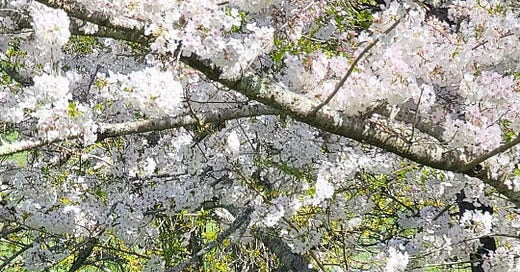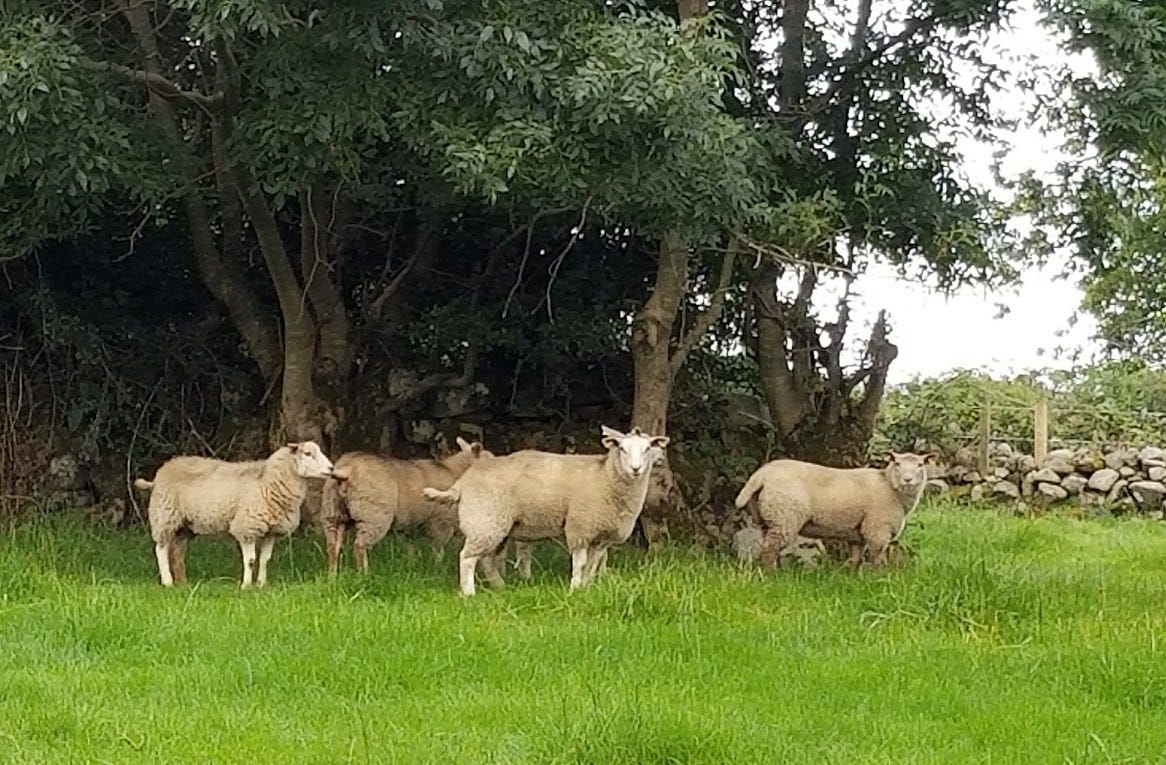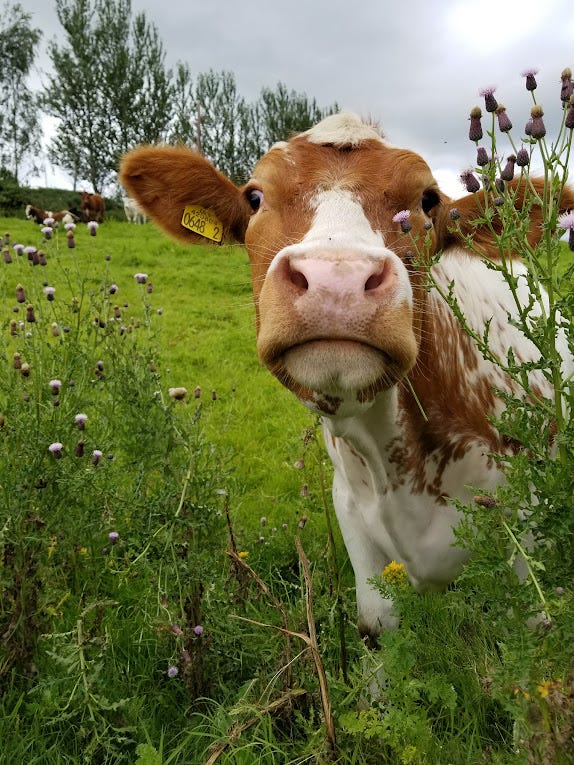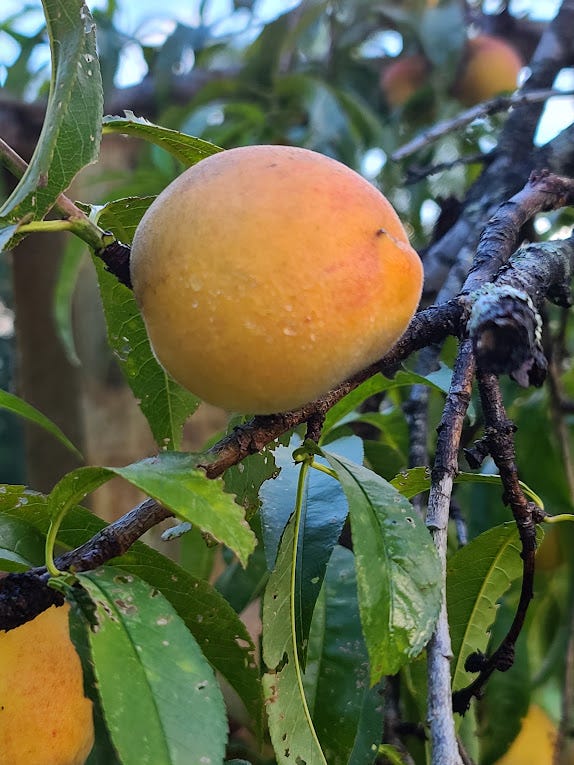"My grandfather used to say that once in your life you need a doctor, a lawyer, a policeman, and a preacher. But every day, three times a day, you need a farmer." (Brenda Schoepp)
Today is the 176th day since Helene and the 21st day of Women’s History Month. It’s a bright sunny morning. Although it was howling when I went to sleep, the wind stopped sometime during the night.
There are three fires burning in Polk County, and another one a little south of us below the state line. Fueled by dry conditions and high winds, the Fish Hook, Deep Woods, and Black Cove fires have collectively burned more than a thousand acres. All three are 0% contained. There are evacuation orders in place. These fires follow the Melrose Fire earlier this month, which burned 619 acres.
Just to be clear, besides smoke and plenty of it, none of these fires are a direct threat to Bear Creek Farm. “Don’t breathe it,” a friend advised. I’m not quite sure how to pull that off, but I’ll take it with the love intended.
I’m not here to talk about fire.
Several years ago, I spent a couple weeks visiting relatives in Ireland. A few of us pooled resources to rent a lovely house in a rural area of County Down. County Down, which was part of the Plantation of Ulster, is home to the Mourne Mountains and is the final resting place of Saint Brigid and Saint Patrick both. I took long walks every morning while I was there, rain or shine. Curious cows and horses came to the fence lines to greet me. Irish cows are inquisitive and friendly. The sheep are a little more cautious. Sheep need to be cautious.
While US agricultural land is being bought up left and right by big interests, foreign and otherwise, most farms in Ireland are still small family endeavors. The cows approve. You can taste their approval in the local butter and cream.
When we moved here, I was once again in the land of small family farms. You can buy local eggs and berries from neighbors just down the street. Even Bear Creek Farm, where our main crop is organic horse manure, has blueberry bushes, a pear tree, and one tenacious peach tree whose best days are behind it. There’s muscadine grapes in our woods. I’m not crazy about muscadine grapes, but they make good jelly.
In the spring, our mouths water as we wait for local strawberries. Just as the strawberries run out, the peaches come into season. With countless varieties, peach season runs long around here. Georgia claims to have the best peaches. Georgia is wrong.
Shortly after the last sweet bite of a Carolina peach, apples come into season. One of the earliest varieties is Tigress apples. The Tigress apple can be described as Granny Smith’s sweeter sister.
Our farmer’s markets here run long, from April well into fall. Eating local is easy here. And delicious. And affordable. Fruit and vegetables. Meat and eggs.
And honey. My husband is a connoisseur of honey. He once met up for a clandestine deal in the parking lot of the Dollar General to buy two jars of his favorite local honey from the beekeeper himself. Beekeepers are shameless dealers. They prey upon John’s addiction.
Small family farms have thrived here for generations, even though it’s often hard going. Farmers get up early and are often still going after dark. It’s been especially hard since Helene.
Helene caused roughly $4.9 billion in damages to Western North Carolina agriculture. Damages included loss of crops and livestock, loss of topsoil, and damage or complete ruin of infrastructure. Barns gone. Equipment gone, Crops and animals gone. It’s like what happened to Sweeney*, except on an epic scale. Catastrophe of biblical proportions.
In some cases, it was enough to make farmers give up. When there’s literally nothing left, there’s nothing left. Some farms aren’t coming back ever. That’s a crying shame.
Yet some of our farmers are still farmers, at least for now. With a little help and even more backbreaking work, they’re mending fences and fertilizing their soil, what’s left of it, and planting crops and watching their peach trees bloom. And hoping. And praying. And hoping some more. Farming is a lifelong act of hopefulness, often in the midst of despair.
Only now it’s getting even harder as support systems go up in smoke.
According to Mariah Squire, a reporter for Successful Farming, “More than 100 USDA agency offices are some of the latest to be selected by the Department of Government Efficiency (DOGE) for lease termination. They’re on a list of nearly 750 government offices on the department’s “Wall of Receipts” falling under the real estate category.’
Agencies affected include Farm Service Agency (FSA) and Natural Resources Conservation Services (NRCS) and their locations cut across 39 states and four territories.”
Close to home, the Farm Service Agency (FSA)in Henderson County, home of the apple festival, is closing. This will affect both the FSA and the Henderson County Soil and Conservation offices. The FSA operates under the auspices of the U.S. Department of Agriculture.
There’s also the cancellation of the federal Local Food Purchase Assistance (LFPA) program. This program gave funds that could be used by food banks to purchase food directly from locally owned farms to buy things like fresh produce, dairy products, and meat. It was a boon for farmers and hungry people.
“By directly buying produce, eggs, dairy, grains, and meat from nearby farms — many of them still recovering from Hurricane Helene — LFPA+ doesn’t just provide funding; it knits together the local supply chain in a way that boosts farm incomes, keeps dollars circulating in our communities, and delivers healthier meal options to those who need it most,” said Claire Neal , the CEO of MANNA Food Bank.
So, what happens when small family farms can’t make it? Monsanto, that’s what happens. Instead of heirloom apples and tomatoes, you end up with genetically modified seeds and chemicals wrapped in plastic on the produce shelves of your local Piggly Wiggly.
Side note: There are no Piggly Wigglies in my immediate vicinity, I just like saying that. There’s one in Old Fort though.
You end up with big agriculture. The Chinese and Bill Gates buying up farmland. And farmers end up working inside Dollar Generals instead of hawking honey in the parking lot where they belong.
We’re living in dangerous times, you and I, and fighting fires may be the least of our worries.
I don’t know what we’ll be when we come out of this. I don’t even know if we will come out of this. This much I do know-- compliance doesn’t make us safe.
Someday, when you and I are long gone, unless of course we’ve blown the planet to smithereens, people will look back at this time. They’ll look back at us. At me. At you. I pray to God they see that we fought for them.
Sending you love and light and the scent of smoke and Carolina peaches on a summer day…
* My dad used to tell a story about a farmer named Sweeney. Sweeney was one of those guys who just couldn’t catch a break. He lived on the edge of ruin. Like many farmers, he borrowed against the next crop to sustain his farm through the current season. Farm life isn’t for the faint of heart.
Yet one year, things were looking good for ol’ Sweeney. He had a bumper crop, and it was the day before harvest. This crop was going to be enough to pay off all his debts, fix his old tractor, put something aside for the next year, maybe even take his wife on that cruise she kept talking about.
A hailstorm came out of nowhere and destroyed his crop. All of it. Gone. Sweeney walked through his destroyed fields lamenting his luck.
He came back inside his house and found a note from his wife on the kitchen table. The note said she’s run off with an encyclopedia salesman from Wichita. As Sweeney sat at the table, his head in his hands, he looked out the window and saw that his barn was on fire.
Sweeney shook his fist at God. “Why me?” he cried, “Why me Lord?”
The clouds parted. A booming voice came down from the heavens.
“I don’t know Sweeney, you just chap my hide.”








Thank you for your wisdom & your continued documentation of the direct effect on local farmers in this age of irresponsible government. Your voice is of paramount importance. So many of us feel trapped, without choices or without choices to continue living. I always told my students: life isn't fair, deal with it. Lately it feels a bit more unfair than is reasonable. Here in the rich country of US there is an expectation of survival with all of our resources. Boggles my mind. Love & light & more honey for John.